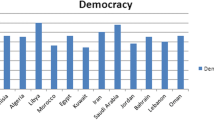Abstract
Often it is maintained that democracy is a luxury which comes at a price in terms of subsequent slower increases in national living standards. However, various recent cross-section studies on economic growth have found evidence that lack of civil and political liberties is negatively correlated with economic growth. Using various measures of democracy the robustness of previous research is examined. Both direct and indirect effects of lack of civil and political liberties are analysed. Our main conclusion is that the relationship between democracy and economic growth is not robust.
Similar content being viewed by others
References
Alesina A, Ozler S, Roubini N, Swagel P (1992) Political instability and economic growth. NBER Working Paper 4173
Alesina A, Rodrick D (1991) Distributive politics and economic growth. CEPR Discussion Paper 565
Alesina A, Perotti R (1994) The political economy of growth: A critical survey of the recent literature. The World Bank Economic Review 8:351–371
Barro RJ (1989) A cross-country study of growth, saving, and government. NBER Working Paper 2855
Barro RJ (1991) Economic growth in a cross section of countries. The Quarterly Journal of Economics 106:407–443
Barro RJ (1994) Democracy and growth. NBER Working Paper 4909
Barro RJ, Lee J (1993) Losers and winners in economic growth. NBER Working Paper 4341
Baumol WJ, Batey Blackman SA, Wolff EJ (1989) Productivity and American leadership: The long view. Cambridge MIT Press
Bollen KA (1990) Political democracy: Conceptual and measurement traps. Comparative International Development 25:7–24
Brunetti A, Weder B (1994) Political sources of growth. Public Choice 82:125–134
Dasgupta P (1990) Well-being and the extent of its realisation in poor countries. The Economic Journal 100:1–32
Feder G (1982) On exports and economic growth. Journal of Development Economics 12:59–73
Fischer S (1993) The role macroeconomic factors in economic growth. Journal of Monetary Economics 32:485–512
Gasiorowski MJ (1993) The political regime change dataset. Louisiana State University
Gastil RD (1990) The comparative survey of freedom: Experiences and suggestions. Studies in Comparative International Development 25:25–50
Grier KB, Tullock G (1989) An empirical analysis of cross-national economic growth, 1951–1980. Journal of Monetary Economics 24:259–276
Haan J de, Siermann CLJ (1994) The impact of democracy and political instability on economic growth: A review. University of Groningen Centre for Development Studies Development and Security 42
Helliwell JF (1992) Empirical linkages between democracy and economic growth. NBER Working Paper 4066
Huntington SP (1968) Political order in changing societies. New Haven Yale University Press
Kormendi RC, Meguire PG (1985) Macroeconomic determinants of growth. Journal of Monetary Economics 16:141–163
Leamer EE (1983) Let's take the con out of econometrics. American Economic Review 73:31–43
Levine R (1991) Economic growth. A review of the theoretical and empirical literature. World Bank Working papers WPS 678
Levine R, Renelt D (1992) A sensitivity analysis of cross-country growth regressions. The American Economic Review 82:942–963
Marsh RM (1988) Sociological explanations of economic growth. Studies in Comparative International Research 23:41–77
Pourgerami A (1988) The political economy of development: A cross-national causality test of development-democracy-growth hypothesis. Public Choice 58:123–141
Przeworski A, Limongi F (1993) Political regimes and economic growth. Journal of Economic Perspectives 7:51–69
Romer PM (1989) What determines the rate of growth and technical change? World Bank Policy Planning and Research Working paper WPS 279
Scully GW (1988) The institutional framework and economic development. Journal of Political Economy 96:652–662
Sirowy L, Inkeles A (1990) The effects of democracy on economic growth and inequality: A review. Studies in Comparative International Development 25:126–157
Sloan J, Tedin KL (1987) The consequences of regime type for public-policy outputs. Comparative Political Studies 20:98–124
Sørensen G (1993) Democracy and democratization. Processes; domestic and international consequences, Boulder Westview
Summers R, Heston A (1991) The pen world table (Mark 5): An expanded set of international comparisons 1950–1988. The Quarterly Journal of Economics 106:327–368
Weede E (1983) The impact of democracy on economic growth: Some evidence from crossnational analysis. Kyklos 36:21–39
White H (1980) A heteroskedasticity-consistent covariance matrix estimator and a direct test for heterosk-edasticity. Econometrica 48:817–838
World Bank (1991) The world development report 1991. Oxford, Oxford University Press
Author information
Authors and Affiliations
Additional information
We would like to thank an anonymous referee for his comments on a previous version of this paper.
Rights and permissions
About this article
Cite this article
de Haan, J., Siermann, C.L.J. A sensitivity analysis of the impact of democracy on economic growth. Empirical Economics 20, 197–215 (1995). https://doi.org/10.1007/BF01205435
Received:
Revised:
Issue Date:
DOI: https://doi.org/10.1007/BF01205435




